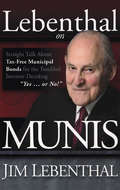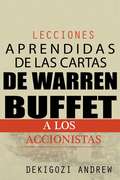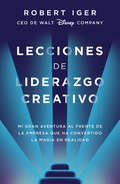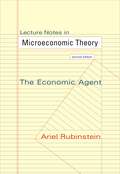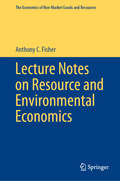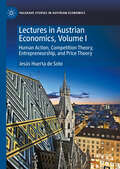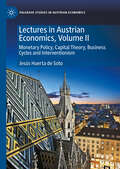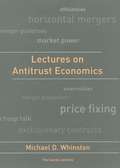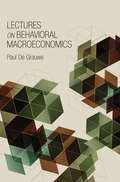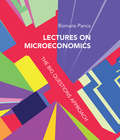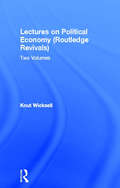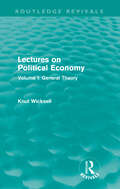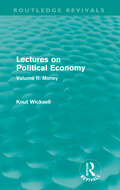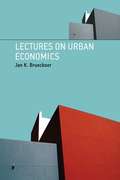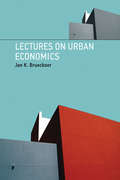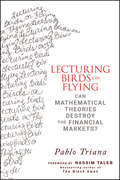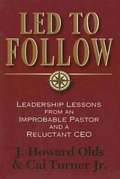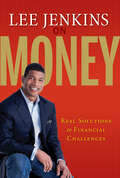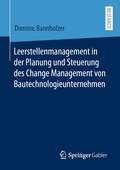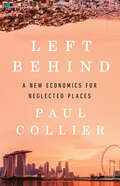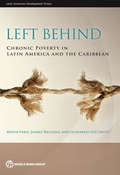- Table View
- List View
Lebenthal on Munis: Straight Talk About Tax-free Municipal Bonds For The Troubled Investor Deciding Yes... Or No!
by Jim LebenthalIF YOU KNEW WHAT I KNOW... Would you buy a municipal bond for the subways in New York City that&’s rated AA-, or only A? Would you care what a bond is for as long, as it&’s a general obligation backed by the issuer&’s full faith, credit, and taxing power? Would you pay 109 for a bond, a premium of $90 for every $1,000 face value, knowing you&’re going to get back only $1,000 at the end??Would it be crazy to buy a 30-year bond at age 80? Would you read &“these bonds are not a debt of the state&” as a fair warning, Buyer Beware??Tax free municipal bonds. Would you buy them at all? STRAIGHT TALK FROM THE MAN WHO PUT MUNIS ON THE MAP FOR THE INDIVIDUAL INVESTOR. Would telling you the whole story about investing in municipal bonds, and making sure you know the risks involved, kill the sale? &“I&’ll take my chances,&” says Jim (Municipal Bonds Are My Babies) Lebenthal. For 45 years, Jim Lebenthal wrote and starred in the Lebenthal family&’s municipal bond business commercials - information nuggets that educated the public and turned munis into a household word, wherever his face and voice were seen and heard. Outraged by what Wall Street had done to the financial markets with reckless abandon, and Bernie Madoff with malice aforethought, Jim gives equal time in Lebenthal On Munis…Deciding, "Yes…" or "No!" to the Whys and Why Nots for investing in his "babies." "Balancing the heady appeal of tax exemption with the payment record of municipal bonds in the Depression and the volatility of resale prices during the inflation tortured '70s and '80s, isn&’t optional for a broker," says Lebenthal. "Full Disclosure is the law." In Lebenthal on Munis, Jim carries out that law, even if Full Disclosure means turning Jim and his babies, thumbs down. DECIDING, "YES…" OR "NO!"
Lecciones aprendidas de las cartas de Warren Buffet a los accionistas
by Silvana Borghi Kigozi AndrewEste libro incluye las cartas de Warren Buffet a sus accionistas como lecciones para inversores. Estas lecciones son: inversiones, gestión de empresas, estructura corporativa. Incluye las recomendaciones de Warren Buffet sobre los tópicos nombrados. Este libro está dirigido a todo tipo de inversores, estudiantes de administración de empresas y todo aquel que esté interesado en los negocios y en las finanzas.
Lecciones de liderazgo creativo: Mi gran aventura al frente de la empresa que ha convertido la magia en realidad
by Robert A. IgerEl CEO de Disney comparte las ideas y los valores que le han permitido reinventar una de las compañías más admiradas del mundo e inspirar a las personas que dan vida a la magia. Robert Iger se convirtió en CEO de la Walt Disney Company en 2005 durante un momento difícil para la empresa. La moral se había deteriorado, la competencia era intensa y la tecnología estaba cambiando más rápido que en cualquier otro momento de la historia. Su proyecto de futuro se basaba en tres ideas muy claras: renovar el compromiso con la importancia de la calidad, integrar la tecnología en lugar de luchar contra ella y pensar con ambición y con una visión global para convertir a Disney en una marca más fuerte en los mercados internacionales. Catorce años después, Disney es la compañía de medios más grande y respetada del mundo, y cuenta entre sus propiedades con Pixar, Marvel, Lucasfilm y 21st Century Fox. Con Robert Iger al frente, reconocido como uno de los CEO más innovadores y exitosos de nuestra era, el valor de la empresa se ha quintuplicado. En Lecciones de liderazgo creativo, Iger comparte las lecciones aprendidas al frente de Disney y de sus 200.000 empleados y explora los principios necesarios para un verdadero liderazgo, que son: Optimismo. Incluso ante las dificultades, un líder optimista encontrará el camino hacia el mejor resultado posible y se centrará en ello, en lugar de ceder ante el pesimismo y la culpa. Valentía. Los líderes deben estar dispuestos a correr riesgos y a hacer grandes apuestas. El miedo al fracaso destruye la creatividad. Decisión. Todas las decisiones, por complejas que parezcan, pueden tomarse de manera oportuna. La indecisión es un derroche y mina la moral. Equidad. Hay que tratar a las personas con decencia, empatía y ser accesible para ellas. Este libro muestra la inagotable curiosidad que ha impulsado a Iger durante cuarenta y cinco años, desde el día en que comenzó como humilde aprendiz en un estudio de la ABC. Y trata también de la consideración y el respeto, y la primacía de la dignidad sobre el dinero que ha sido fundamental en todos los proyectos impulsados por Iger, desde la profunda amistad con Steve Jobs en sus últimos años hasta el perdurable amor por la mitología de «Star Wars». «Las ideas de este libro me parecen universales», escribe Iger. «No solo para los aspirantes a CEO del mundo, sino para todas aquellas personas que quieran sentirse menos temerosas, con más confianza en sí mismas, en su trayectoria profesional e incluso personal.» Reseñas:«Cultivar la creatividad es más un arte que una habilidad, especialmente en una empresa que es sinónimo de creatividad. Y eso constituye un gran reto. Bob Iger no solo ha estado a la altura de noventa y seis años de una historia revolucionaria, sino que ha llevado la marca Disney mucho más allá de cualquier expectativa y lo ha hecho con audacia y con acierto. Este libro cuenta cómo lo ha logrado.»Steven Spielberg «Hemos esperado años a que Bob Iger compartiera sus secretos de liderazgo. Por fin lo ha hecho y son absolutamente brillantes. Lecciones de liderazgo creativo no son solo unas memorias, pues el libro ofrece la oportunidad de departir abiertamente con el CEO más clarividente, sino también son una guía imprescindible para afrontar los desafíos más relevantes de nuestra era: cómo impulsar el cambio, aprovechar la tecnología, construir una cultura duradera y empoderar a las personas. Una lectura apasionante y muy reveladora.»Daniel Coyle, autor de Cuando las arañas tejen juntas pueden atar a un león y El pequeño libro del talento «Era de esperar que una obra escrita por la persona que ha dirigido Disney durante décadas destacara por un relato apasionante y por una gran sabiduría sobre el liderazgo. Bob Iger lo ha conseguido y ha ido incluso más allá. Su libro
Lecciones de negocios de Bill Gates
by Michael Winicott Alejandro Robles VargasBill Gates es una figura icónica en el mundo de hoy. Él es una inspiración para los jóvenes y una lección para los viejos. Ha alcanzado esas alturas del éxito y gloria que sólo unos cuantos han sido capaces de alcanzar en sus vidas y vale la pena leer su historia de vida y vale la pena aprender de ella. Lecciones de negocios de Bill Gates es un libro que promete contar la historia de Bill Gates desde una nueva perspectiva: las lecciones que él aprendió durante su vida. Entonces, ¿estás listo para aprender de la vida de Bill Gates? ¿Estás interesado en aprender acerca de negocios y emprendimiento? Y lo más importante, ¿estás listo para aprender acerca de la vida? Todo esto y más en este fascinante libro. Aquí hay un avance de lo que aprenderás... Cómo hacer lo que tu consideras apropiado, no lo que otros esperan Cómo hacer riesgos calculados y ¡triunfar! Cómo construir la fuerza de voluntad para enfrentar las adversidades y triunfar Cómo tomar ventaja de las inevitables fallas en tu camino Lo que debe hacerse y lo que no debe hacerse de la carrera de Bill.
Leckenby Co.
by David A. Lax Thomas T. WeeksThis game is a highly structured exercise in labor-management bargaining. If union and management cannot reach agreement within two days, then the union will strike. The costs of a strike are not the same for the two sides. Similarly, the cost of a settlement to management differs from its benefits to the union. Union and management players frequently feel that they are more powerful, hold out, endure a strike, and do poorly relative to other players.
Lecture Notes in Microeconomic Theory: The Economic Agent - Second Edition
by Ariel RubinsteinAriel Rubinstein's well-known lecture notes on microeconomics—now fully revised and expandedThis book presents Ariel Rubinstein's lecture notes for the first part of his well-known graduate course in microeconomics. Developed during the fifteen years that Rubinstein taught the course at Tel Aviv University, Princeton University, and New York University, these notes provide a critical assessment of models of rational economic agents, and are an invaluable supplement to any primary textbook in microeconomic theory.In this fully revised and expanded second edition, Rubinstein retains the striking originality and deep simplicity that characterize his famously engaging style of teaching. He presents these lecture notes with a precision that gets to the core of the material, and he places special emphasis on the interpretation of key concepts. Rubinstein brings this concise book thoroughly up to date, covering topics like modern choice theory and including dozens of original new problems.Written by one of the world's most respected and provocative economic theorists, this second edition of Lecture Notes in Microeconomic Theory is essential reading for students, teachers, and research economists.Fully revised, expanded, and updatedRetains the engaging style and method of Rubinstein's well-known lecturesCovers topics like modern choice theoryFeatures numerous original new problems—including 21 new review problemsSolutions manual (available only to teachers) can be found at: http://gametheory.tau.ac.il/microTheory/.
Lecture Notes on Resource and Environmental Economics (The Economics of Non-Market Goods and Resources #16)
by Anthony C. FisherThis book, based on lectures on natural and environmental resource economics, offers a nontechnical exposition of the modern theory of sustainability in the presence of resource scarcity. It applies an alternative take on environmental economics, focusing on the economics of the natural environment, including development, computation, and potential empirical importance of the concept of option value, as opposed to the standard treatment of the economics of pollution control. The approach throughout is primarily conceptual and theoretical, though empirical estimation and results are sometimes noted. Mathematics, ranging from elementary calculus to more formal dynamic optimization, is used, especially in the early chapters on the optimal management of exhaustible and renewable resources, but results are always given an economic interpretation. Diagrams and numerical examples are also used extensively.The first chapter introduces the classical economists as the first resource economists, in their discussion of the implications of a limited natural resource base (agricultural land) for the evolution of the wider economy. A later chapter returns to the same concerns, along with others stimulated by the energy and environmental “crises” of the 1970s and beyond. One section considers alternative measures of resource scarcity and empirical findings on their behavior over time. Another introduces the modern concept of sustainability with an intuitive development of the analytics. A chapter on the dynamics of environmental management motivates the concept of option value, shows how to compute it, then demonstrates its importance in an illustrative empirical example. The closing chapter, on climate change, first projects future changes and potential catastrophic impacts, then discusses the policy relevance of both option value and discounting for the very long run.This book is intended for resource and environmental economists and can be read by interested graduate and advanced undergraduate students in the field as well.
Lectures in Austrian Economics, Volume I: Human Action, Competition Theory, Entrepreneurship, and Price Theory (Palgrave Studies in Austrian Economics)
by Jesús Huerta de SotoThis book, the first of two volumes, comes to life through the transcription of captivating classroom lectures spanning several years, providing a comprehensive overview of the core topics within Austrian economics. With a focus on microeconomics, it explores foundational ideas within Austrian economics, including human action, entrepreneurship, competition theory, and price theory, to give readers a deep understanding of each topic unravelling complex economic concepts with clarity and precision. Economic uncertainty, rationality, marginal utility, productivity, exchange interactions, valuation, price determination, and monopoly are also discussed. Through a seamless blend of theory and real-world examples, readers are invited to challenge conventional wisdom and explore the implications of Austrian economics on society and individual freedom. This book offers an accessible and engaging synthesis of Austrian economics that redefines the topic within modern economics. It will be relevant to students, teachers, and scholars of many other academic institutions around the world, interested in the approach of the Austrian School of economics and its relevance in today’s ever-evolving world.
Lectures in Austrian Economics, Volume II: Monetary Policy, Capital Theory, Business Cycles and Interventionism (Palgrave Studies in Austrian Economics)
by Jesús Huerta de SotoThis book, the second of two volumes, provides a comprehensive overview of the core topics within Austrian economics. With a focus on macroeconomics, it explores foundational ideas within Austrian economics, including monetary and banking theory, law, capital theory, business cycles, the relationship between the market and the state, and interventionism. These ideas are contextualized within the history of economic thought, in particular the work of Ludwig von Mises. The Keynesian system, reform to the banking system, wages, social order, fiscal policy, and the political economy of ethics are also discussed. This book offers an accessible and engaging synthesis of Austrian economics that redefines the topic within modern economics. It will be relevant to students and researchers interested in Austrian economics and the political economy.
Lectures on Antitrust Economics
by Michael D. WhinstonAntitrust law regulates economic activity but differs in its operation from what is traditionally considered "regulation." Where regulation is often industry-specific and involves the direct setting of prices, product characteristics, or entry, antitrust law focuses more broadly on maintaining certain basic rules of competition. In these lectures Michael Whinston offers an accessible and lucid account of the economics behind antitrust law, looking at some of the most recent developments in antitrust economics and highlighting areas that require further research. He focuses on three areas: price fixing, in which competitors agree to restrict output or raise price; horizontal mergers, in which competitors agree to merge their operations; and exclusionary vertical contracts, in which a competitor seeks to exclude a rival. Antitrust commentators widely regard the prohibition on price fixing as the most settled and economically sound area of antitrust. Whinston's discussion seeks to unsettle this view, suggesting that some fundamental issues in this area are, in fact, not well understood. In his discussion of horizontal mergers, Whinston describes the substantial advances in recent theoretical and empirical work and suggests fruitful directions for further research. The complex area of exclusionary vertical contracts is perhaps the most controversial in antitrust. The influential "Chicago School" cast doubt on arguments that vertical contracts could be profitably used to exclude rivals. Recent theoretical work, to which Whinston has made important contributions, instead shows that such contracts can be profitable tools for exclusion. Whinston's discussion sheds light on the controversy in this area and the nature of those recent theoretical contributions. Sponsored by the Universidad Torcuato Di Tella
Lectures on Behavioral Macroeconomics
by Paul De GrauweIn mainstream economics, and particularly in New Keynesian macroeconomics, the booms and busts that characterize capitalism arise because of large external shocks. The combination of these shocks and the slow adjustments of wages and prices by rational agents leads to cyclical movements. In this book, Paul De Grauwe argues for a different macroeconomics model--one that works with an internal explanation of the business cycle and factors in agents' limited cognitive abilities. By creating a behavioral model that is not dependent on the prevailing concept of rationality, De Grauwe is better able to explain the fluctuations of economic activity that are an endemic feature of market economies. This new approach illustrates a richer macroeconomic dynamic that provides for a better understanding of fluctuations in output and inflation. De Grauwe shows that the behavioral model is driven by self-fulfilling waves of optimism and pessimism, or animal spirits. Booms and busts in economic activity are therefore natural outcomes of a behavioral model. The author uses this to analyze central issues in monetary policies, such as output stabilization, before extending his investigation into asset markets and more sophisticated forecasting rules. He also examines how well the theoretical predictions of the behavioral model perform when confronted with empirical data. Develops a behavioral macroeconomic model that assumes agents have limited cognitive abilities Shows how booms and busts are characteristic of market economies Explores the larger role of the central bank in the behavioral model Examines the destabilizing aspects of asset markets
Lectures on Microeconomics: The Big Questions Approach (The\mit Press Ser.)
by Romans PancsEconomic concepts and techniques presented through a series of "big questions," models that show how to pose a questions rigorously and work toward an answer.This book helps readers master economic concepts and techniques by tackling fundamental economic and political questions through a series of models. It is organized around a sequence of “big questions,” among them: When do markets help translate individuals' uncoordinated, selfish actions into outcomes that are best for all? Do markets change people, and, if so, for worse or better? Translated into the language of modern economics, do Marx's ideas have merit? Why is there so much income inequality? Or is there too little? The arguments are in the theorem-proof format, distinguishing results derived in the context of fully specified models from educated speculation. Readers will learn how to pose a question rigorously and how to work toward an answer, and to appreciate that even (especially!) the broadest and most ambitious questions call for a model. The goal of the book is not to indoctrinate but to show readers how to reason toward their own conclusions.The first chapter, on the Walrasian model of general equilibrium, serves as the prerequisite for the rest of the book. The remaining chapters cover less conventional topics, including the morality of markets; matching theory; Marxism, socialism, and the resilience of markets; a formalization of Kant's categorical imperative; unintended consequences of policy design; and theories of justice. The book can be used as a textbook for advanced undergraduate or graduate students or as a resource for researchers in disciplines that draw on normative economics.
Lectures on Political Economy: Two Volumes (Routledge Revivals: Lectures on Political Economy)
by Knut WicksellKnown as the "economist's economist" for his work on creating a synthetic economic theory, Swedish economist Knut Wicksell was a controversial, but highly influential figure in modern economic thought. His contributions to marginal productivity theory, income distribution and, most notably, his theory of interest would come to have a profound impact upon twentieth century economic theory, not least in the work of John Maynard Keynes. First published in English in 1934 and 1935, this Routledge Revival set is a reissue of Wicksell's two volume work on political economy, first published in Sweden in 1901 and 1906. This work is aimed at both the professional economist and the advanced student alike, as well as all those interested in the theoretical development of political economy. Volume I concerns itself predominantly with issues of theory: specifically the theory of value, the theory of production and distribution and the theory of capital accumulation. Volume II deals with theories relating to money, currency and credit.
Lectures on Political Economy: Volume I: General Theory (Routledge Revivals: Lectures on Political Economy)
by Knut WicksellFirst published in English in 1934, this Routledge Revival is a reissue of Volume I of Swedish economist Knut Wicksell's hugely influential work two volume work on political economy, a text which influenced a generation of economists. Concerned predominiantly with a mathematical treatment of issues of economic theory, the first volume deals specifically the theory of value, the theory of production and distribution and the theory of capital accumulation. Wicksell examines the origin of interest and offers a solution to the problem of distribution under capitalistic production, referencing the work of Eugen vom Böhm-Bawerk and Karl Gustav Cassel.
Lectures on Political Economy: Volume II: Money (Routledge Revivals: Lectures on Political Economy)
by Knut WicksellFirst published in English in 1935, this Routledge Revival is a reissue of Volume II of Knut Wicksell's Lectures on Political Economy. This volume deals with his contribution to macroeconomics, through an explication of economic theory and principle relating specifically to money, both in terms of functions and value, with a particular emphasis upon currency and credit. This volume also includes Wicksell's work on the quantity theory of money in which he first made the important distinction between the real rate of return on new capital (which he called the "natural rate of interest") and the actual market rate of interest.
Lectures on Urban Economics
by Brueckner Jan K.Lectures on Urban Economics offers a rigorous but nontechnical treatment of major topics in urban economics. To make the book accessible to a broad range of readers, the analysis is diagrammatic rather than mathematical. Although nontechnical, the book relies on rigorous economic reasoning. In contrast to the cursory theoretical development often found in other textbooks, Lectures on Urban Economics offers thorough and exhaustive treatments of models relevant to each topic, with the goal of revealing the logic of economic reasoning while also teaching urban economics. Topics covered include reasons for the existence of cities, urban spatial structure, urban sprawl and land-use controls, freeway congestion, housing demand and tenure choice, housing policies, local public goods and services, pollution, crime, and quality of life. Footnotes throughout the book point to relevant exercises, which appear at the back of the book. These 22 extended exercises (containing 125 individual parts) develop numerical examples based on the models analyzed in the chapters. Lectures on Urban Economics is suitable for undergraduate use, as background reading for graduate students, or as a professional reference for economists and scholars interested in the urban economics perspective.
Lectures on Urban Economics
by Jan K. BruecknerA rigorous but nontechnical treatment of major topics in urban economics. Lectures on Urban Economics offers a rigorous but nontechnical treatment of major topics in urban economics. To make the book accessible to a broad range of readers, the analysis is diagrammatic rather than mathematical. Although nontechnical, the book relies on rigorous economic reasoning. In contrast to the cursory theoretical development often found in other textbooks, Lectures on Urban Economics offers thorough and exhaustive treatments of models relevant to each topic, with the goal of revealing the logic of economic reasoning while also teaching urban economics. Topics covered include reasons for the existence of cities, urban spatial structure, urban sprawl and land-use controls, freeway congestion, housing demand and tenure choice, housing policies, local public goods and services, pollution, crime, and quality of life. Footnotes throughout the book point to relevant exercises, which appear at the back of the book. These 22 extended exercises (containing 125 individual parts) develop numerical examples based on the models analyzed in the chapters. Lectures on Urban Economics is suitable for undergraduate use, as background reading for graduate students, or as a professional reference for economists and scholars interested in the urban economics perspective.
Lecturing Birds on Flying
by Nassim Nicholas Taleb Pablo TrianaPraise for Lecturing Birds On Flying"Finally, a book taking a critical look at quantitative finance models, illuminating both their flawed fantasy assumptions as well as the uncritical use of such models on Wall Street, in many cases, leading to billion dollar losses. Pablo Triana knows both the financial industry and the academic community from the inside. A must-read for anyone interested in finance."--Dr. Espen Gaarder Haug, trader, thinker, and author of Derivatives Models on Models"A thoroughly readable explanation of the problems that have beset the models and quantitative techniques that have underpinned so much of finance in recent years. If only the bankers had heeded this message a few years before, we might not be in such a big mess today."--Gillian Tett, Assistant Editor of the Financial Times, overseeing global financial markets coverage, and author of Fool's Gold"Pablo Triana dismembers quantitative finance, in theory and in practice, with expertise, anger,and an excellent eye for the illuminating anecdote. By the time he has finished marshalling his evidence, his call to replace complex equations with something more like common sense sounds like, well, common sense."--Edward Hadas, Assistant Editor at Breakingviews.com; and author of Human Goods, Economic Evils: A Moral Approach to the Dismal Science"Pablo Triana is an entertaining and engaging writer, even on the dry subject of finance theory. His debunking of conventional wisdom is a treat."--Pauline Skypala, Editor, FTfm, Financial Times"Triana's book is an unrelenting fusillade of detailed and irrefutable arguments against financial theorems and those who teach them. It should, by rights, spark a revolution in both investment banks and business schools. But, at the very least, it is required reading for anyone who would regulate the finance industry."--Felix Salmon, Finance Blogger, Reuters
Led to Follow: Leadership Lessons from an Improbable Pastor and a Reluctant CEO
by J. Howard Olds Cal Turner JR.With an open, honest, and conversational style, a minister who also manages and a manager who also ministers share insights they've gained through failures, successes, and struggles in their personal and professional journeys. From crises in the family business to existential struggles in the face of recurring cancer, what they show us is this: the heart and soul of leadership is found in following: following your call, following others' input, following your failures, following change, and even following the unknown. If you seek wisdom for your journey, if you seek a life of deep dedication and fulfillment, this book is for you.
Lee Jenkins on Money: Real Solutions to Financial Challenges
by Lee JenkinsAn unstable economy. A shaky stock market. Businesses facing huge financial losses. People losing their homes, jobs, savings, and...hope?Is the sky falling in? Some feel that way. Is God still in control? Others wonders as they see and experience fallout from the greed and corruption that is seemingly pushing our nation to the brink of bankruptcy. In Lee Jenkins on Money, financial analyst Lee Jenkins answers questions about the nation's changing economy and other financial matters readers may be facing in the midst of this difficult financial climate. He helps them take a sober and responsible look at their finances and challenges them to be faithful stewards over what God has entrusted to them. Lee shows that by looking at life from God's perspective and applying biblical principles to their finances, readers bear witness to the fact that God is still in control and there is still hope.
Lee Jenkins on Money: Real Solutions to Financial Challenges
by Lee JenkinsAn unstable economy. A shaky stock market. Businesses facing huge financial losses. People losing their homes, jobs, savings, and...hope?Is the sky falling in? Some feel that way. Is God still in control? Others wonders as they see and experience fallout from the greed and corruption that is seemingly pushing our nation to the brink of bankruptcy. In Lee Jenkins on Money, financial analyst Lee Jenkins answers questions about the nation's changing economy and other financial matters readers may be facing in the midst of this difficult financial climate. He helps them take a sober and responsible look at their finances and challenges them to be faithful stewards over what God has entrusted to them. Lee shows that by looking at life from God's perspective and applying biblical principles to their finances, readers bear witness to the fact that God is still in control and there is still hope.
Leerink Swann & Co.: Creating Competitive Advantage
by Boris Groysberg Andrew N. McleanIn the spring of 2005, CEO Jeff Leerink has called a meeting of the executive committee to formulate Leerink Swann's growth strategy over the next five years so that it accomplishes three goals: expand into a new business, reinforce the firm's legacy businesses, and maximize the synergies between different parts of the firm. Covers the history of the boutique investment bank, including the nature and source of its personnel and culture, the development of its competitive strategy, the leadership style of its founder, and the development of each department, product, and function.
Leerstellenmanagement in der Planung und Steuerung des Change Management von Bautechnologieunternehmen
by Dominic BannholzerProbabilistisch gesehen werden Unternehmen Change Management erfolgreich betreiben müssen, um nachhaltig erfolgreich zu sein. Dominic Bannholzer stellt in seiner Untersuchung – auch basierend auf der breit geführten wissenschaftlichen Diskussion – fest, dass die Veränderungsprozesse oftmals zu starr gestaltet sind, Emergenz nicht (oder nur selten) zugelassen wird und kybernetische Möglichkeiten vernachlässigt werden. Ferner wird dargelegt, welche Bedeutung z.B. die Kommunikation sowie die Partizipation von Mitarbeitenden hat. Daraus abgeleitet werden Lösungen präsentiert, wie die autopoietische Fähigkeit von Unternehmen erfolgversprechender gestaltet werden kann, in dem gezielt «Leerstellen» im Veränderungsprozess implementiert werden. Konkret wird erforscht, welche Bedeutung Sinnlücken, Führungslücken, räumliche und soziale Lücken sowie Kommunikations- und Beziehungslücken für den Veränderungsprozess haben und wie damit erfolgsversprechend umzugehen ist. Dieses Buch beleuchtet Aspekte, welche in dieser Form bisher einzigartig sind und, wenn man das bisherige Forschungsfeld betrachtet, als besonders innovativ und erfolgsversprechend angesehen werden dürfen.
Left Behind: A New Economics for Neglected Places
by Paul CollierFrom the bestselling author of The Bottom Billion, the fate of the poorest regions of the world–some of which exist in the richest nations–is examined. Using examples of the &“left behind&” regions, renowned development economist Paul Collier shows that centralized western economies have been the most ineffective to alleviate poverty—even if nationally the country seems to be growing. In Left Behind, Collier examines how the assumption that any impoverished area will find a way to progress through market forces has devastated nations all over the world. With keen insight, he draws lessons from such disparate fields as behavioral psychology, evolutionary biology, and moral philosophy to explain how we can adapt to the needs of individual economies in order to build a brighter and fairer global future.
Left Behind: Chronic Poverty in Latin America and the Caribbean
by Jamele Rigolini Renos Vakis Leonardo LucchettiOne out of every five Latin Americans or around 130 million people have never known anything but poverty, subsisting on less than US$4-a-day throughout their lives. These are the region´s chronically poor, who have remained so despite unprecedented inroads against poverty in Latin America and the Caribbean since the turn of the century. Left Behind: Chronic Poverty in Latin America and the Caribbean takes a closer look at the region's entrenched poor, who and where they are, and how existing policies need to change in order to effectively assist them. The book shows significant variations of rates of chronic poverty both across and within countries. Within a single country, some regions show incidence rates up to eight times higher than the lowest. Despite the higher rates of chronic poverty in rural areas, chronic poverty is as much an urban as a rural issue. In fact, considering absolute numbers, urban areas in many countries, including Chile, Brazil, Mexico, Colombia and the Dominican Republic, have more chronic poor than rural areas. Undoubtedly the region has come a long way during the decade in terms of poverty reduction, guided by a mix of sustained growth and increased levels in amounts and quality of public spending and programs targeted directly or indirectly to the chronic poor. While improving endowments and the context where the chronic poor live is a necessary condition going forward, the decade's experience suggests that it may not be enough to reach the chronic poor. The book posits that refinements to the existing policy toolkit " as opposed to more programs " may come a long way in helping the remaining poor. These refinements include intensifying efforts to improve coordination between different social and economic programs, which can boost the income generation process and deal with the intergenerational transmission of chronic poverty by investing in early childhood development. Equally important though, there is an urgent need to adapt programs to directly address the psychological toll of chronic poverty on people's mindset and aspirations, which currently undermines the effectiveness of the existing policy efforts.
